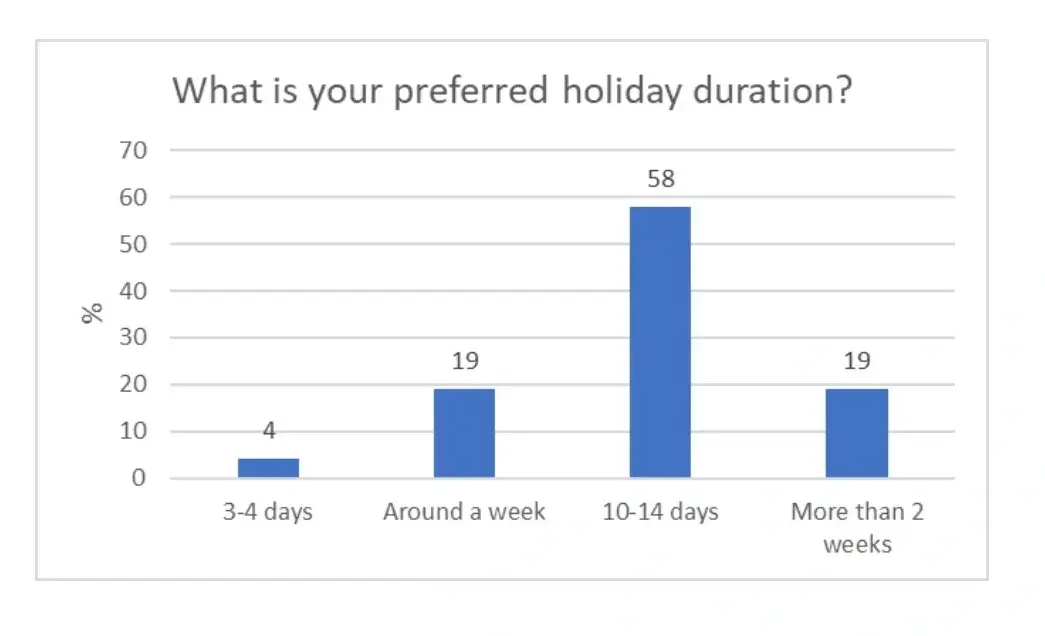Dr Charlotte Russell, Clinical Psychologist & Founder
When it comes to travel, I’ve always been an advocate of ‘the longer, the better’, but recently I’ve started to enjoy shorter trips more and this has made me question my long held beliefs. In this article I’m going to talk you through the evidence around duration and well-being and answer the question of ‘what is the best duration for a holiday?’. I’ll also provide some top tips on making the most of your trip, however long you have.
What does the research say?
One Australian study of University staff found that short breaks (3-4 days) could be as restorative as longer vacations (Packer, 2021). This study measured self-reported feelings of restoration and performance on cognitive tests in. The research suggested that certain conditions when travelling can contribute to the trip having positive benefits and providing feelings of restoration. These conditions were being physically away from our home and work and having activities that fascinate us or occupy our minds.
A more recent study in China looked at the restorative effects of holidays of different durations (Cui, 2023). The impressive thing about this study was that multiple questionnaires were administered before, during and after participants’ trips. It was found that restoration was optimal for those who chose holidays with a duration of around 4 days.
It was also found that those who engaged in slightly challenging activities when they were on holiday experienced the restorative feelings of their trip for longer when they returned home. This was an impressive finding. These challenging activities included things like talking to strangers, learning new skills such as scuba diving and problem solving.
This tells us that activities on holiday may be as important as the duration, and that we should be aiming for activities that slightly stretch us and our comfort zone! This echoes advice from our previous articles Can travel help to keep our brain healthy and active as we age? and Travel & talking to strangers.
What do our readers think?
To find out the opinions of our readers, I asked our Instagram community some questions about their ideal holiday duration. Twenty-six of our Instagram followers took part. We are a group of travel lovers and are not a representative sample, but it is interesting to understand the views of those who may be similar to us. Results were as follows:

The chart shows that a sizable majority of participants (58%) indicated that their ideal holiday duration would be between 10 and 14 days.
A good proportion of our sample indicated that they feel more relaxed after a longer trip (83% agreed or strongly agreed). Most participants also felt that a longer trip helps them to immerse themselves (90% agreed or strongly agreed).
So, overall most our readers preferred slightly longer trips and felt that they have greater benefits when in comes to relaxation and fully immersing themselves.
So why is there a discrepancy?
Our readers indicated that they preferred longer trips, which contrasts with the research which suggests that shorter breaks can be more restorative. An obvious explanation for this is that our sample is very skewed; our readers are likely to be travel-enthusiasts and so logically it makes sense that we would enjoy longer holidays and find them more restorative compared to the general population.
Conclusions and tips
There is really no clear answer when it comes to the impact of duration on well-being. However I would encourage you to think about the following when it comes to deciding what duration works for you:
Ask yourself ‘What duration has worked best for me in the past’?
Our past experiences are always the best indicator of what is going to work for us in the future. We are all unique and have different preferences and needs, so use your previous experiences to plan your future trips.
If you have tended to get bored on a longer break in the past then that is good evidence that shorter breaks might work well for you. If you are travelling a greater distance and want to stay longer, you might find that visiting several destinations for a few days each works best.
If you have struggled to relax and unwind on shorter trips in the past, of course one option is to increase the duration. If this fits with your budget and you can get sufficient time off work then great.
Think about your current needs
You may have particular stressors going on in your life that mean you are feeling burnt out and need more rest than usual. You might have been working on a really intense project at work, have been dealing with a stressful situation in your personal life or you may work in a role that comes with risk factors for burnout. If this is the case then it is really important to consider your need for rest and to build this into your travel plans.
If your needs are to explore, seek and discover then it is likely that you will need more than a few days on your trip. These are the kinds of feelings that may prompt us to take an extended trip.
If you’re craving something new and different and a break from your routine then a few days on a city break may be right for you . Check out our previous article The psychology behind our love of city breaks
Be realistic
Most of us don’t get the chance to travel as much as we’d like to. If you’re employed and you have a limited leave balance, it would be unwise to use your entire leave on one trip and then feel miserable for the rest of the year. Think about how you can ration your limited time off to meet your needs.
Unfortunately social media often provides unrealistic expectations that it is possible to travel all the time. This may be case for the few, but not the majority. Also remember that popular accounts are usually intended to provide inspiration and whist there is nothing wrong with this in itself, it is important to realise that this is not real life.
Plan a ‘buffer zone’ before and after your trip
It is really not helpful to be super busy in the few days leading up to your trip. This often means that you will be feeling stressed and then you will need to spend the first few days winding down, which can be detrimental. Think about ways that you can wind down on the days leading up to your trip so that you are not feeling wound up and stressed. Also think about having a day or two when you return home to adjust to being back.
If you struggle with post-travel blues, check out our guide here
Don’t let worries about the duration get in the way of your trip
Focusing on the time you have left or whether you would have wanted to stay longer is not conducive to your enjoyment of your trip. Focus on enjoying the time that you have at your destination, and make the most of it. Think about the time you have and what you would most like to see, visit or do, rather than trying to do too many things in limited time and rushing. Make it your intention to be really present and enjoy what you’re doing rather than treating your trip as a checklist or things to tick off. The more you practise this, the more you will be able to stay in the moment!
Most of all enjoy your time away.
References
Cui, R. (2023). Travel duration and the restorative effects of holiday experiences: an inverted U-shape. Tourism Review.
Packer, J. (2021). Taking a break: exploring the restorative benefits of short breaks and vacations. Annals of Tourism Research Empirical Insights, 2(1), 100006.

